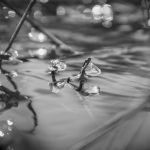New Research on Anti-Cancer Botanicals
Node Smith, ND
A team of NUS researchers has recently discovered that the Bandicoot Berry (Leea indica), South African leaf (Vernonia amygdalina) and Simpleleaf Chastetree (Vitex trifolia), which are favorite nectaring plants of butterflies, do more than attract butterflies. The leaves of these plants have been found to be effective in stopping the growth of seven types of cancers, namely breast, cervical, colon, leukemia, liver, ovarian and uterine cancers.
Leaves of these plants have been found to be effective in stopping the growth of seven types of cancers
In this study that is led by Associate Professor Koh Hwee Ling from NUS Pharmacy, three other medicinal plants had also demonstrated anti-cancer properties.
“Medicinal plants have been used for the treatment of diverse ailments since ancient times, but their anti-cancer properties have not been well studied. Our findings provide new scientific evidence for the use of traditional herbs for cancer treatment, and pave the way for the development of new therapeutic agents,” said Assoc Prof Koh.
The results of the study
The results of the study, which was published in the Journal of Ethnopharmacology, a leading peer-reviewed international journal, highlight the importance of conserving these indigenous plants as resources for drug discovery and understanding these natural resources.
Therapies based on folk knowledge
In Southeast Asian countries such as Singapore and Malaysia, while modern medicine is the primary form of healthcare, there is also a tradition of using local medicinal plants for health promotion and the treatment of diseases.
“Given the scarcity of land due to rapid urbanisation and the dearth of records on herbal knowledge, there is a pressing need to document and investigate how indigenous medicinal plants were used before the knowledge is lost,” explained Dr Siew Yin Yin, who did the research as part of her doctoral thesis under the supervision of Assoc Prof Koh.
Three-year study documented the different types of medicinal plants grown in Singapore region
The three-year study, which was conducted between 2010 and 2013, documented the different types of medicinal plants that grow in Singapore and the region. The NUS team found that the top three reasons for using medicinal plants were for general health promotion, detoxification and to boost the immune system. Among the medicinal plants documented, some were reported to be used for the treatment of cancer. These findings were first reported in the Journal of Ethnopharmacology in 2014.
Cancer-fighting properties put to the test
The researchers reviewed the pharmacological properties of the tropical plants that were reported to be used for cancer, and they selected seven promising plant species for further investigation. These medicinal plants are Bandicoot Berry (Leea indica), Sabah Snake Grass (Clinacanthus nutans), Fool’s Curry Leaf (Clausena lansium), Seven Star Needle (Pereskia bleo), Black Face General (Strobilanthes crispus), South African Leaf (Vernonia amygdalina), and Simpleleaf Chastetree (Vitex trifolia).
Experiments involved preparing extracts and testing with cell lines of seven different types of cancers
The experiments involved preparing extracts of fresh, healthy and mature leaves of the seven plants, and testing the extracts with the cell lines of seven different types of cancers – breast, cervical, colon, leukemia, liver, ovarian, and uterine. The team opted to examine leaves as they can regrow without harming the plants – this is a sustainable choice, unlike using the bark or roots.
Extracts of the leaves of the Bandicoot Berry generally found to be promising
Among the seven plants, the extracts of the leaves of the Bandicoot Berry, South African Leaf and Simpleleaf Chastetree were generally found to be promising against the seven types of cancers. The leaf extracts of the Seven Star Needle had performed well against cervical, colon, liver, ovarian and uterine cancer cells. The leaf extracts of two other plants – Fool’s Curry Leaf and Black Face General – had demonstrated efficacy against some cancer cell lines, too.
What the researchers did not expect
“What we did not expect is that the leaf extract of the Sabah Snake Grass was not very effective in inhibiting growth of cancer cells. In our earlier study, this plant was frequently reported to be used by cancer patients in the region. One possibility could be that it may be helping cancer patients in other ways, rather than killing the cancer cells directly,” shared Assoc Prof Koh.
Next steps
While the results of this study provided the scientific basis for the traditional practice of using tropical medicinal plants to fight cancer, the research team stressed that people should not self-medicate without consulting qualified practitioners.
“More research is required to identify the active components responsible for the anti-cancer effects. Meanwhile, conservation of these medicinal plants is highly crucial so that there is a rich and sustainable source that could be tapped upon for the discovery of anti-cancer drugs,” elaborated Assoc Prof Koh.
NUS research team will also be evaluating their other pharmacological effects
Besides studying the active components in the tropical medicinal plants, the NUS research team will also be evaluating their other pharmacological effects in order to understand the use of selected plants by patients and the public, and to further harness the benefits of medicinal plants for safe and efficacious use. They also hope to collaborate with clinical and industry partners to further their research.
From National University of Singapore
 Node Smith, ND, is a naturopathic physician in Humboldt, Saskatchewan and associate editor and continuing education director for NDNR. His mission is serving relationships that support the process of transformation, and that ultimately lead to healthier people, businesses and communities. His primary therapeutic tools include counselling, homeopathy, diet and the use of cold water combined with exercise. Node considers health to be a reflection of the relationships a person or a business has with themselves, with God and with those around them. In order to cure disease and to heal, these relationships must be specifically considered. Node has worked intimately with many groups and organizations within the naturopathic profession, and helped found the non-profit, Association for Naturopathic Revitalization (ANR), which works to promote and facilitate experiential education in vitalism.
Node Smith, ND, is a naturopathic physician in Humboldt, Saskatchewan and associate editor and continuing education director for NDNR. His mission is serving relationships that support the process of transformation, and that ultimately lead to healthier people, businesses and communities. His primary therapeutic tools include counselling, homeopathy, diet and the use of cold water combined with exercise. Node considers health to be a reflection of the relationships a person or a business has with themselves, with God and with those around them. In order to cure disease and to heal, these relationships must be specifically considered. Node has worked intimately with many groups and organizations within the naturopathic profession, and helped found the non-profit, Association for Naturopathic Revitalization (ANR), which works to promote and facilitate experiential education in vitalism.
Node Smith graduated from the National University of Natural Medicine (NUNM) in 2017, and is currently licensed as a naturopathic physician in Oregon and working towards becoming licensed in Saskatchewan, Canada as well.










